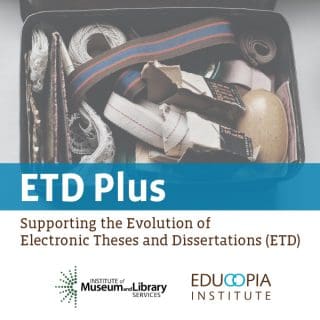
Preservation & Curation of ETD Research Data & Complex Digital Objects (ETDplus) Grant Narrative
Colleges and universities and the programs responsible for managing the submission, archiving, and dissemination of electronic theses & dissertations (ETDs) increasingly are concerned about administering and making available the research datasets and complex digital objects (multimedia files, software, etc.) that often accompany these scholarly works. These assets represent a rich source of information that can help to substantiate the dissertation and provide assurance that the foundation for replicable research is available for future researchers. These datasets and complex digital objects are also of great value and interest to libraries seeking to advance their missions in the digital age. ETD datasets and complex digital objects however, do pose curation and preservation challenges for institutions in terms of the viability of formats, file sizes, accessibility rights, dissemination pathways, and change-management issues. Recent reports, workshop evaluations, projects, surveys, and focus groups have indicated that U.S. colleges, universities and ETD/IR programs of all sizes are requesting and in need of generalized yet adaptable guidance documentation, shared curation technologies, and corresponding training materials to bridge the preservation and curation gap for these valued scholarly assets.
The Educopia Institute, in partnership with University of North Texas, and in concert with the Networked Digital Library of Theses and Dissertations (NDLTD), HBCU Alliance, bepress, ProQuest, and the libraries of Virginia Tech, University of Tennessee, Purdue, Carnegie Mellon, Oregon State, Penn State, Morehouse, University of Louisville, and Indiana State propose a two-year project to improve ETD policies and practices around research data and complex digital object management nationally. The project will answer the question: How will institutions ensure the longevity and availability of ETD research data and complex digital objects (e.g., software, multimedia files) that comprise an integral component of student theses and dissertations?